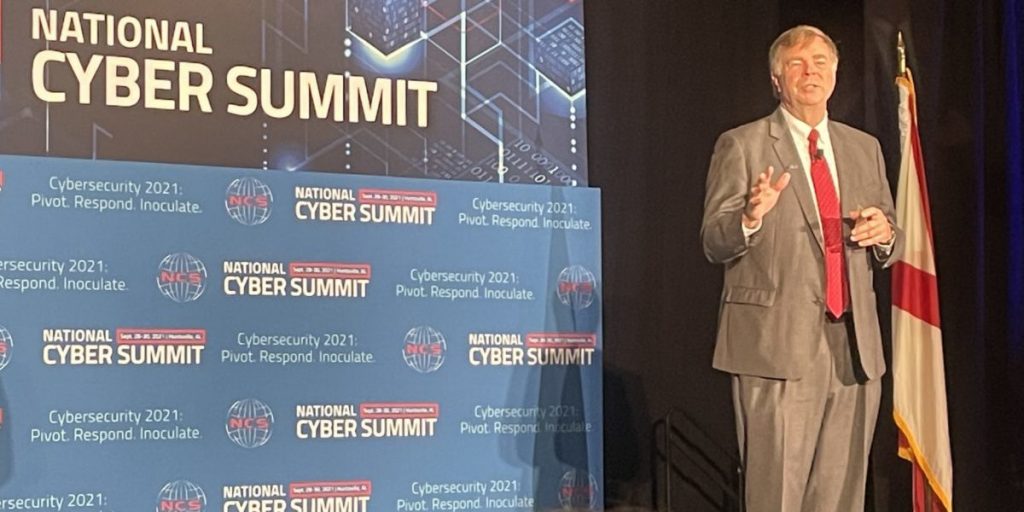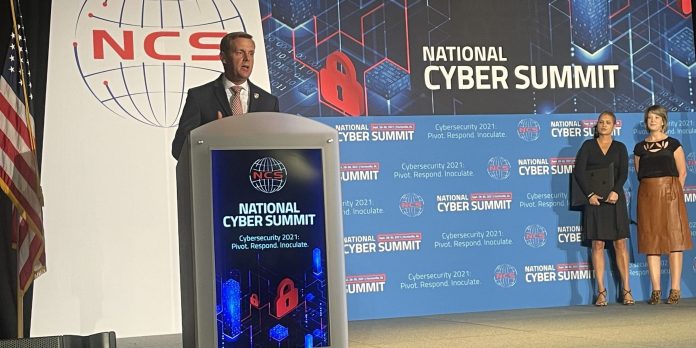HUNTSVILLE — The Rocket City this week is hosting the National Cyber Summit, a prestigious network consisting of field experts from the public and private sectors.
Over 2,500 attendees will attend this year’s summit at the Von Braun Center in downtown Huntsville. The Summit features networking events, professional panels, and expert presentations consisting of industry and law enforcement brass in cybersecurity.
Judy Darwin, vice president of Cyber Huntsville, is serving as the Summit’s first female director. She holds over 16 years of experience in the fields of cybersecurity and information technology.
Darwin told Yellowhammer News that the Summit has made great strides over the years, as the first year saw around 200 participants, with it doubling with each passing year. “This is the largest participation we’ve ever had,” she said with jubilation.
.@NatlCyberSummit director Judy Darwin kicks off Wednesday’s events at Huntsville’s Von Braun Center as the Rocket City plays host to the prestigious cybersecurity network. pic.twitter.com/wR7m47XqBC
— Dylan Smith (@DylanSmithAL) September 29, 2021
She went on to express her appreciation to all who played an integral role in ensuring the Summit’s success. This year’s attendees featured not only local and regional participants, but individuals from various parts of the country and have even garnered international attention.
After kicking off this year’s summit, Darwin introduced Mayor Tommy Battle to the stage, where he touted the city’s hosting of the network, saying Huntsville has increasingly grown its industrial base consisting of premier cyber business and workforce talent.
The mayor touched on his vision to attract cyber-oriented companies to the city and the collaboration of the Huntsville community which led to North Alabama becoming a prime location for high technology industry.
“We pulled together some people from the industry,” Battle said, speaking of how the formation of Cyber Huntsville came to fruition. “Cyber Huntsville was one of the founding groups that got us started in the cyber world. As we got started we started working with [Regional Computer Forensics Laboratory] out on the Arsenal and working with the FBI, our good partners, and we started looking at some other ideas about what we can do.”

He added, “Today, we are building Alabama’s magnate cyber school… being built right out in Research Park and it will have kids from all over Alabama who will come and stay and be educated in cyber. We know that the community that can provide the workforce is the community that will win the cyber wars.”
He went on to outline community leadership’s coordination with local educational institutions to train students in the field of cybersecurity, which led to Huntsville-based universities and community colleges launching cyber-oriented degree offerings.
FBI executive assistant director of Criminal, Cyber, Response, and Services Branch Brian Turner was the Summit’s first keynote speaker. A former FBI special agent, Turner spent nearly a decade in the U.S. Army and formerly taught at West Point.
Tuner offered his expert insight on the need to harden the nation’s cyber infrastructure, pointing to rogue nation-state actors and foreign adversaries’ successful attempts to breach United States cyber systems.
“While we continue to see crime committed in traditional ways, cyber-related aspects of all national security threats have continued to expand and evolve,” said Turner. “The FBI, as a lead domestic law enforcement and intelligence agency is central to the efforts to counter criminal and national security cyber threats to the United States and its citizens,” going on to state that the FBI has fostered productive working relationships with the private sector identify and halt such threats.
Also speaking on the need to protect the nation’s vital cyber assets was Dr. Raj Iyer, chief information officer of the Office of the Secretary of the Army. Iyer touched on what can be done on a personal level to combat the growing threats posed in the world of cyber. He expressed the importance of adhering to cybersecurity protocols when conducting private business and the need to remain vigilant in protecting personal data.
To wrap up keynote introductions, Alabama School of Cyber Technology and Engineering (ASCTE) president Matt Massey hailed the school’s partnership with premier business management consulting firm Deloitte.
“When I got announced in this position just over two years ago, Deloitte was right on the front lines helping us with their subject matter experts to get us going and launched,” said Massey, going on to present the firm with a plaque honoring its partnership with the school.
Carey Miller, managing director at Deloitte, expressed appreciation to the school for providing opportunities for students across the Yellowhammer State to enter the emerging field of cyber.
“I want to thank the business leaders… and the government agency partners because you guys inspire and motivate these students while they’re in school and give them an opportunity afterward,” stated Miller.
“I’m personally from a small town in South Alabama, and I know how much this school means to children across the state of Alabama, I know how much opportunities the school provides means to all of those families out there,” she added. “At Deloitte, one of our goals is to make an impact with our clients, our schools and our communities. The benefit of this partnership is it really provides impact across all three.”
Dylan Smith is a staff writer for Yellowhammer News. You can follow him on Twitter @DylanSmithAL
Don’t miss out! Subscribe to our email newsletter to have all our smart stories delivered to your inbox.



